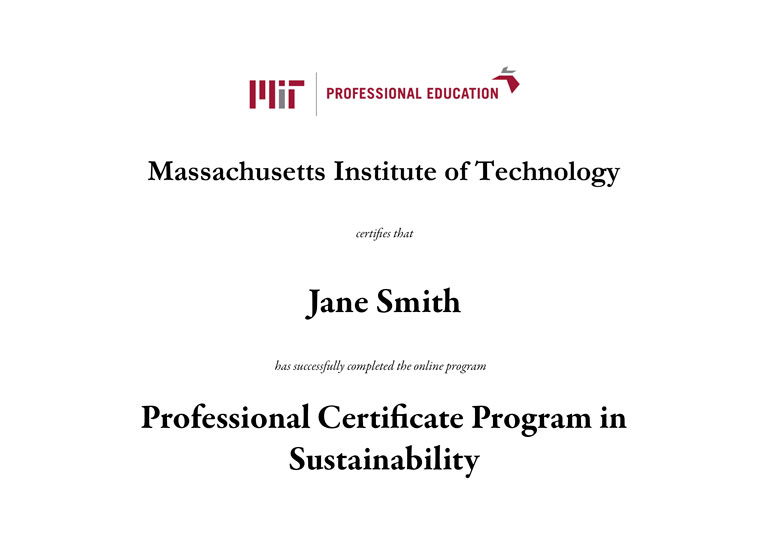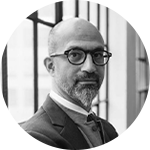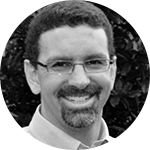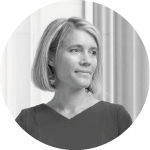Why is Sustainability so Important for Industry and the World at Large?
The full scope of ‘Sustainability’ covers a range of topics from our global environment to industries and infrastructure, to complex geopolitical dynamics. All are inextricably interconnected. Understanding the limitations of our outdated systems at every level, in every field, is a critical first step in understanding how we can begin to envision a better way forward.
The programs in this professional certificate have been carefully chosen by experts in the field of sustainability to emphasize the family of knowledge and related practices most conducive to producing comprehensive sustainable change.
Realizing our current state of sustainability is essential. From here we must highlight how to evolve, enhance, and implement our systems for the future. Today, more than ever, we rely on leaders who are experts in the subjects of sustainability, and who can execute sustainable change from the ground up. MIT Professional Education’s Professional Certificate in Sustainability is aimed at professionals who want to better execute sustainable practices in their chosen sectors or areas of influence.
An Online Professional Certificate Program for Sustainability
Will you lead the charge forward towards a more optimized and sustainable future? Our Professional Certificate will provide you with the critical foundational education and tools necessary to produce real, lasting changes in the modern world and future for generations to come.
This Professional Certificate in Sustainability will place an emphasis on:
Metrics for
measuring sustainability
Theory for
comprehensive understanding
Strategy and planning
for implementation
Practical exercises
and applications
The Learning Journey
In this 12-month online program, participants will explore these four courses and one additional elective course in-depth to discover how to better understand and implement Sustainable Management.
Sustainability: Strategies and Opportunities for Industry
Sustainable Infrastructure Systems: Planning and Operations
Inadequate and dilapidated infrastructures pose a grave threat to human life and stifle economic potential. In the US alone, underinvestment in infrastructure negatively impacts GDP, employment, personal income, and global trade, costing typical household an average of $3300 per year.* With systems theory as a basis, you will learn how to measure sustainability, study interlinkages, and extract data for planning to create optimized infrastructure systems.
*American Society of Civil Engineers’ Failure to Act Report
Life Cycle Assessment: Quantifying Environmental Impacts
environmental improvements.
Life Cycle Assessment is an increasingly significant concept and method for assessing and supporting sustainable transitions in manufacturing, reducing costs, and improving brand identity. Its features become additionally important in terms of compliance with the evolution of sustainable policy agreements and the maintenance of a reputable sustainable organization.
Circular Economy: Transition for Future Sustainability
Learn to understand how greenhouse gas emission, waste recovery, and frameworks in our urban infrastructures factor into the concept and materialization of a circular economy. As we transition to renewable energy and materials, we can do so with business models that benefit the economy, humanity, and the environment. Understand how incorporating circular models can help drive profits and economic prosperity while also benefiting the environment. Comprehend the nuances of how circular economy factors in as a critical link of broader sustainable management.
Clean Energy Solutions: Technological Change to Meet Emissions Reduction Targets
Data-informed analysis is essential for developing effective strategies for addressing climate change. This course presents a holistic and quantitative picture of the challenge of climate change mitigation, and of solutions to meet emissions reduction targets. Participants will learn about pathways for reaching climate goals set by governments and companies, with a focus on supporting a transition toward clean energy systems. The course will cover concepts and models to support strategic decisions in technology development, investment, and public policy design.
The skills you will develop
MIT Professional Education’s Professional Certificate in Sustainability seeks to equip professionals from various industries with the critical skills and expertise they need to improve sustainability in their given spheres of influence.
By immersing yourself in the five courses the Professional Certificate in Sustainability consists of, you will become a well-rounded and reliable agent for change in matters of sustainability, and develop potent skills in:
1.
Identifying the root causes of environmental decline that have caused economic and social damage, leading to an increased and urgent need for sustainable practices.
2.
Effectively assimilating information from a wide range of fields related to sustainability.
3.
Exploring metrics and evaluation methods for determining sustainability of the different components of systems.
4.
Describing key technologies that enable the circular economy including materials recycling, water purification, and gas treatment.
5.
Analyzing and critique the outputs of circular economy models and simulations to gain confidence in existing outputs.
6.
Calculating different measurements of sustainability.
7.
Mapping out interactions between components, identifying feedback and potential unintended consequences, as well as system lock-in.
8.
Estimating the rates of change needed in determinants of greenhouse gas (GHG) emissions.
9.
Formulating policies directed at promoting real-world, effective sustainable practices.
In addition, you will receive a Certificate of Completion
All the participants who successfully complete Sustainability will recieve a Certificate of Completion from MIT Professional Education. Furthermore, the participants who complete the program recieve Continuing Education Units (CEUs)*.
To obtain CEUs, complete the accreditation confirmation, which is available at the end of the course. CEUs are calculated for each course based on the number of learning hours.
* The Continuing Education Unit (CEU) is defined as 10 contact hours of ongoing learning to indicate the amount of time they have devoted to a non-credit/non-degree professional development program.
To understand whether or not these CEUs may be applied toward professional certification, licensing requirements, or other required training or continuing education hours, please consult your training department or licensing authority directly.

This Professional Certificate is designed for
Professionals interested in climate change mitigation efforts and innovation opportunities, as well as those with a desire to make meaningful changes in the way they approach and implement Sustainable Practices regarding infrastructure and industry. The certificate is particularly useful for professionals who want to establish a comprehensive understanding of sustainability for the benefit of their organizations or business ventures. The participants poised to benefit most from the expertise and skills shared through this course include:
- Engineers and technical professionals looking to take a data-informed approach to devising climate change mitigation solutions that are informed by an understanding of the role and evolution of various energy technologies.
- C-suite executives and mid-to-senior-level managers seeking to develop an understanding of the concepts and key definitions of systems theory and its relation to infrastructure development and engineering.
- Policymakers and development agencies interested in gaining insights into sustainable infrastructure improvements and development to support economic growth while working toward targets such as the UN SDGs.
- R&D, finance, and investment managers seeking insights into how to best optimize their energy-related portfolios through better anticipation of technological breakthroughs in the field.
- Climate Consortium members who aim to vastly accelerate the implementation of large-scale, real-world solutions to meet climate change challenges, while inspiring transformative climate progress across industries and across the globe.
- Consultants seeking to provide their clients with innovative and sustainable infrastructure solutions for business problems while demonstrating credibility and capability through a respected course.
- Industries and sectors that are very material-intensive wanting to mitigate the impact that they have on the environment and seek out more sustainable and effective methods in the construction process of their materials.
- *Professionals in the fields of marketing, sales, business development, market analysis, consulting, policy, and entrepreneurship will also benefit from the resources offered in this program.
*We recommend that functional and multifunctional teams participate in the program together to accelerate the adoption of sustainable practices.
Meet the instructors of this program
Listed in alphabetical order

Professor Fernández is first and foremost a practicing architect who has designed more than 2.5 million square feet of new construction in major cities around the world including New York City, Tokyo, and Shanghai.
His work in sustainability began with research regarding materials for high performance buildings, low energy residence, and urbanization.
• He founded the MIT Urban Metabolism Group to focus his research on the resource intensity of cities as well as on design and technology pathways for future urbanization, taking part in projects across four continents.
• He is a member of more than 15 organizations, the most prestigious of which being his role on the Board of Directors of the Building Envelope Technology and Environmental Council of the National Institute of Building Science; New Ecology, Inc; and the Center for Sustainable Energy of the Fraunhofer Institute.
• He is also a proud author of two books and numerous articles in scientific and design journals, as well as a speaker for conferences and symposia around the world.

Research topics include product and firm environmental foot-printing, manufacturing and life-cycle cost analysis, and characterization of sustainable material systems. He has applied these methods, often with industry partners, to a range of products and industries, including pavements, buildings, automobiles, electronics, consumer goods, and waste treatment and recovery. Gregory earned a BS in mechanical engineering from Montana State University, and an MS and PhD in mechanical engineering from MIT.

Furthermore, Olivetti’s research addresses improving the sustainability of materials through increased use of recycled and renewable materials, recycling-friendly material design, and intelligent waste disposition and understanding the implications of substitution, dematerialization, and waste mining on materials markets.
Olivetti is a part of MIT’s Climate Nucleus, a committee established to address MIT's ambitious new plan, “Fast Forward: MIT’s Climate Action Plan for the Decade.” Furthermore, she is the founder of The Olivetti Group, which focuses on quantifying the impact of and providing strategies for increasing the resource, economic, and environmental effectiveness of materials in the context of rapidly expanding global markets.

• Siddiqi earned her B.S. in mechanical engineering, M.S. in aeronautics and astronautics, and Ph.D. in aerospace systems, all from MIT.
• She received the Rene H. Miller Prize in Systems Engineering and was a recipient of the Amelia Earhart and Richard D. Dupont fellowships.
• Siddiqi has co-authored one book and over 90 publications in some of the world’s foremost technical and scientific journals.

Her models have also been used to inform government innovation policy and applied in diverse industries, including finance, healthcare, manufacturing, software, and consumer products. Trancik’s work has been published in journals such as Nature, Proceedings of the National Academy of Sciences, Nature Energy, Nature Climate Change, and Environmental Science and Technology, and has been featured by news outlets such as The New York Times, The Washington Post, Financial Times, and NPR.
Professor Trancik received her Bachelor of Science from Cornell University and her PhD from the University of Oxford as a Rhodes Scholar.
Trancik develops data-informed models to evaluate the economic and environmental impacts of energy technologies over time and space.
Trancik’s models for forecasting technological change have informed engineering design, public policy, and investment portfolios.

Since 2001, de Weck’s group has developed original quantitative methods and tools that explicitly consider manufacturability, flexibility, commonality, and sustainability, among other characteristics. De Weck’s teaching emphasizes excellence, innovation, and the irrefutable bridge between theory and practice.
• De Weck holds a degree in industrial engineering from ETH Zurich and an M.S. in aeronautics and astronautics from MIT.
• He earned his Ph.D. in aerospace systems from MIT.
• De Weck was an engineering program manager on the F/A-18 aircraft program at McDonnell Douglas.
Application Process
Complete the application form and pay the non-refundable fee.
Receive a call for an interview with our admissions team
Our Admission Committee will inform the final decision*. *(2 business days max)